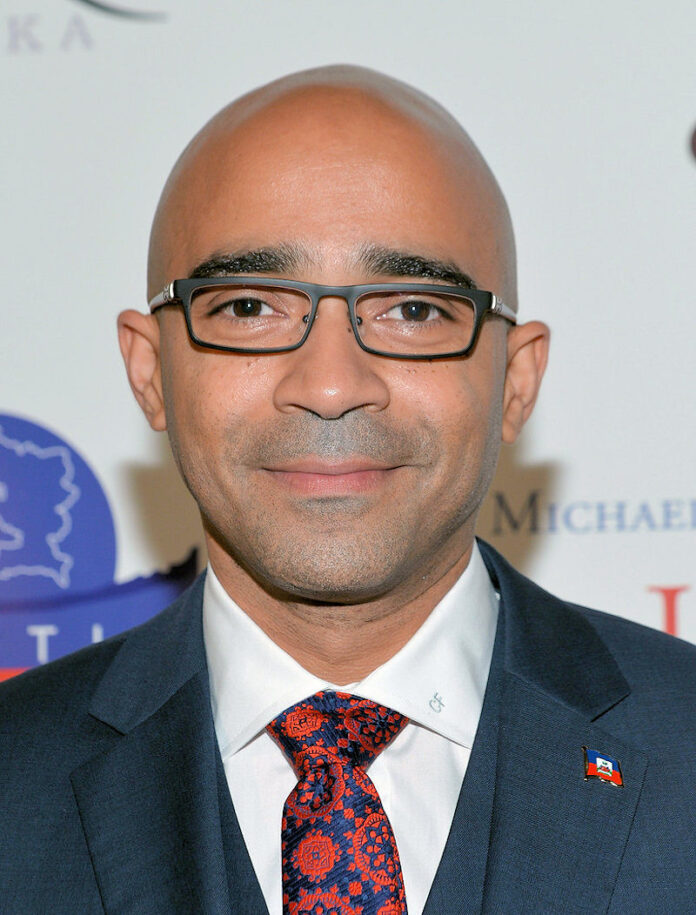
According to Charles Antoine Forbin, the Haitian Consul General of New York, “Brooklyn College didn’t ask us for money” to host President Michel Martelly’s address to a largely Haitian audience at the school’s 2,350-seat Walt Whitman Theatre on Sep. 26.
But a Brooklyn College spokesperson denies the claim.
Forbin told Haïti Liberté that local politicians of Haitian origin like New York City Councilman Mathieu Eugène and Nassau County legislator Carrie Solages “all sent letters for us to get Brooklyn College” for free.
But a Brooklyn College spokesman replied on Oct. 2 that “the Haitian Consulate officially rented the Whitman Theater and handled tickets, invitations, and the program.”
When told that Forbin claimed the hall had been provided free of charge, the spokesman said: “That’s strange, because we have a contract. They are paying. I’m not sure where he’s getting that stuff from.”
According to an anonymous source in the Consulate, the cost of renting Brooklyn College came to about $12,000, covering hall rental, sound, and security, but has not yet been paid. Councilman Eugène claimed that the matter “is still in process.”
“That’s strange, because we have a contract. They are paying. I’m not sure where he’s getting that stuff from.”
Forbin also told Haïti Liberté that the auditorium was filled by “4,000 people, with 125 people outside.” But only the bottom of the theatre, not the balcony, was open, and not quite completely full. “That would be about 1,400 to 1,500 people,” said Richard Grossberg, Walt Whitman’s Executive Director and General Manager.
Forbin said that he was very pleased with how the event turned out. “It was an extraordinary success,” he said. “Compared with [President Martelly’s speech in 2011 at] York College, where they didn’t even have 400 people, but this year, you saw the success that President Martelly had in the diaspora.”
When asked for names of those who supported the event financially, “you can just say that the entire diaspora of New York got together to have us get Brooklyn College,” Forbin said.
Most of the people waiting at the gate outside the auditorium could not enter because they had no ticket. But he said those trying to get into the Martelly event, and not protesting, were on “the right side of the road,” a reference to the hundreds of Haitians who were demonstrating behind police barricades on the other side of the street outside the school. “We are going on the up side of the road, and they are going on the down side, if you understand what I mean,” Forbin said. “There are some people who lost credibility in this town. Enough is enough.”
Tickets to the President’s speech were distributed for free at “barbershops, money transfer establishments, and churches,” Forbin said. “The only thing that we paid was the band, and then the band didn’t even play. In fact, it was going to be a group of bands. One singer from Tabou, one singer from Skah Shah, and one singer from Carimi.”
But the bands were scrubbed “because the president said he didn’t come here for that, he came to speak to his community.”
When a Haïti Liberté reporter expressed surprise at Forbin’s assertion that Brooklyn College had been provided for free, he said: “It’s only you who don’t appreciate the President, but everybody internationally appreciates him.”
Asked about the expensively printed but misspelled Kreyòl posters saying “Aba Gran Gou” (Down with Hunger) and “Viv Ti Manman Cherie” (Long Live Dear Little Momma) with a smiling portrait of President Martelly, Forbin said he did print them. “It was my job to make them,” he said. “As Consul General, it’s my job to let the community know what the government is doing.”









